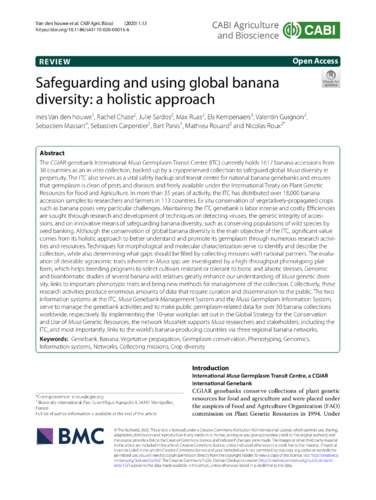Safeguarding and using global banana diversity: a holistic approach
The CGIAR genebank International Musa Germplasm Transit Centre (ITC) currently holds 1617 banana accessions from 38 countries as an in vitro collection, backed-up by a cryopreserved collection to safeguard global Musa diversity in perpetuity. The ITC also serves as a vital safety backup and transit centre for national banana genebanks and ensures that germplasm is clean of pests and diseases and freely available under the International Treaty on Plant Genetic Resources for Food and Agriculture. In more than 35 years of activity, the ITC has distributed over 18,000 banana accession samples to researchers and farmers in 113 countries. Ex situ conservation of vegetatively-propagated crops such as banana poses very particular challenges. Maintaining the ITC genebank is labor intense and costly. Efficiencies are sought through research and development of techniques on detecting viruses, the genetic integrity of accessions, and on innovative means of safeguarding banana diversity, such as conserving populations of wild species by seed banking. Although the conservation of global banana diversity is the main objective of the ITC, significant value comes from its holistic approach to better understand and promote its germplasm through numerous research activities and resources. Techniques for morphological and molecular characterization serve to identify and describe the collection, while also determining what gaps should be filled by collecting missions with national partners. The evaluation of desirable agronomic traits inherent in Musa spp. are investigated by a high-throughput phenotyping platform, which helps breeding programs to select cultivars resistant or tolerant to biotic and abiotic stresses. Genomic and bioinformatic studies of several banana wild relatives greatly enhance our understanding of Musa genetic diversity, links to important phenotypic traits and bring new methods for management of the collection. Collectively, these research activities produce enormous amounts of data that require curation and dissemination to the public. The two information systems at the ITC, Musa Genebank Management System and the Musa Germplasm Information System, serve to manage the genebank activities and to make public germplasm-related data for over 30 banana collections worldwide, respectively. By implementing the 10-year workplan set out in the Global Strategy for the Conservation and Use of Musa Genetic Resources, the network MusaNet supports Musa researchers and stakeholders, including the ITC, and most importantly, links to the world's banana-producing countries via three regional banana networks.

